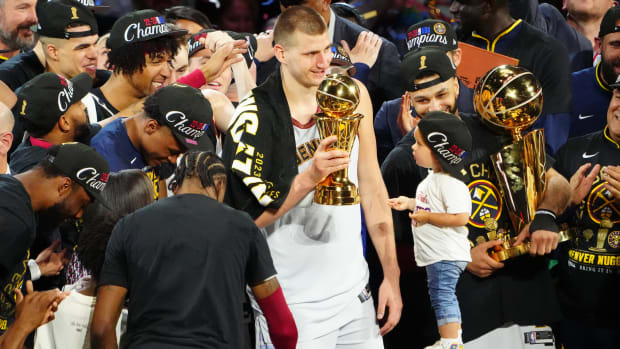One of the most fascinating interviews to go back and watch stems from May 1991, when then NBC analyst Pat Riley got a chance to sit down with Bulls superstar Michael Jordan.
Jordan had won three league MVPs in four years and had led the NBA in essentially every advanced metric—including win shares—for a fifth consecutive season. That prompted Riley, a coach with four NBA titles to his credit at the time, to ask whether it would somehow diminish Jordan’s legacy if he failed to ever earn one.
“If you don’t win a title, will you still feel like you’d have a very whole, fulfilling career?” Riley asked.
“I would,” Jordan said in response. “It would be disappointing that I never won. But my career would never, ever be disappointing. … I’d much rather win. But if I don’t, I’m not gonna look back at my career and say, ‘It was tarnished because I never won a world championship.’”
We all know how that story ended, with Jordan going on to win all six of his Finals appearances. But in hindsight, it makes the conversation of titles look silly, because a legend’s greatness exists with or without a championship. Still, in today’s increasingly hot-take culture, where clips from shows like First Take and Undisputed dominate the airwaves and social media sites, it’s hard to imagine that an enormous portion of fans and analysts wouldn’t see an all-time great’s career as something of a failure if it ended without an NBA championship.

Ron Chenoy/USA TODAY Sports
Hell, the drumbeat on that line of thinking seemed to already be beginning this season, when questions were being raised about whether Nikola Jokić would have been a deserving MVP for a third straight season, given that it was a feat no one had accomplished in almost 40 years (since Larry Bird from 1983 to ’86). The thinking went: How could someone like Jokić—exceptionally skilled, but without even a conference title to his name—be put on that level?
But as of Monday, such shortsighted questions could thankfully be put to rest. Never again will someone have to ask whether Jokić is deserving because of what his résumé doesn’t say. In earning the Nuggets’ first NBA title, the Serbian big man became the first player in postseason history to finish the playoffs with the most points, rebounds and assists. He will now be discussed the way he always deserved: without caveats and as one of the greatest to ever play the sport. He’s a dominant, back-to-basket big man who certainly has old-school appeal to his game, but he’s also a deadeye, if occasionally unwilling, jump shooter. Jokić is hands down the best passer in the sport—at times, he throws defenses off by making a catch and tossing a dime in the same fluid motion. At others, he uses his eyes to play tricks on defenders who are expecting to throw the ball in one direction before whipping it to a shooter standing on the other side of the floor. And despite not being known for his defense, where he’s long been better than he gets credit for, he made several key plays on that end to help the clinch the game against the Heat on Monday. His highly active hands and constant deflections and kickballs make the 7-footer formidable enough on defense, as opponents find themselves being more mindful of losing the ball around him, partly making up for what all Jokić doesn’t provide as a rim protector.
Watch the NBA with fuboTV. Start your free trial today.
Of course, much of this was in plain sight, or at least should have been. Jokić, like Jordan, has been the most statistically dominant player in the world for three years now. (Also of note: Jordan, LeBron James, Magic Johnson, Isiah Thomas, Steph Curry and Shaquille O’Neal, among others, were all 27 when they won their first NBA title. This was Jokić’s age-27 campaign, per Basketball Reference; he just turned 28 on Feb. 19.) While he lacks Giannis Antetokounmpo’s otherworldly athleticism and Joel Embiid’s league-leading scoring marks and imposing rim protection, Jokić is more efficient than both men as a scorer. He generally manipulates the game however he wants to on the offensive side of the ball. In fact, this past season, as Jokić took fewer shot attempts with second and third stars Jamal Murray and Michael Porter Jr. back healthy, his effective field goal rate reached career-high levels, at 66%. None of that even touches on the fact that he nearly averaged 10 assists per game—and a triple double for the season—showcasing how he helped raise his teammates’ games. At one point, the Nuggets had won 29 consecutive games in which Jokić logged a triple double.
There were only a handful of ingredients that seemed to be missing for Jokić before this. Finally having Murray, whose pick-and-roll game with Jokić is lethal, and Porter, obviously helped. But the additions of 3-and-D extraordinaire Kentavious Caldwell-Pope and sixth-man playmaker Bruce Brown were huge. And the play of forward Aaron Gordon, who was a perfect fit from the first game when he joined the team two and a half years ago, was arguably even more vital.
As for Jokić, who ran through and often dominated perennial Defensive Player of the Year candidates Rudy Gobert, Anthony Davis and Bam Adebayo this postseason, he’s long had this game-changing ability. The networks have always catered to the bigger markets, better-known names and brash talkers. But from the first MVP on, Jokić has long deserved more credit and attention for his play, just as the oft-injured Nuggets did as contenders, even if they hadn’t ever gotten it done. They always had the potential to if and when things broke the right way, and this time, with Jokić playing the best basketball of his life and his costars pitching in, they finally did.







